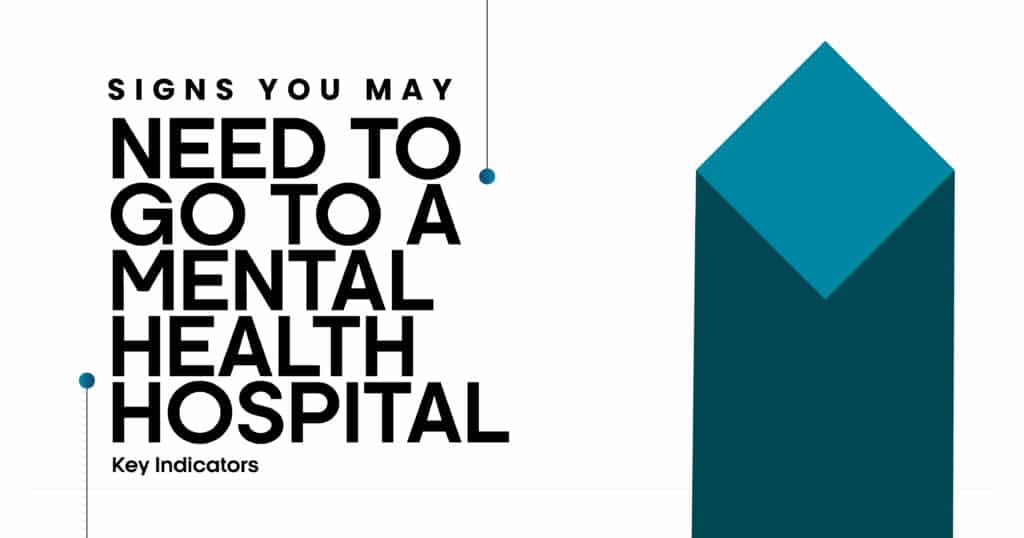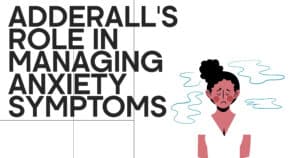Should I go to a mental hospital? When this question comes up in your mind, there must have been a good reason for it – you are feeling mentally unstable, your mood shifts cause you to hurt yourself and damage your relationships with others, or you are afraid that without talking to a mental health professional immediately your suicidal ideations might cause you to act on them.
This article will help you discover the key signs that may indicate you need professional health at a mental health hospital – learn how to identify when to seek treatment and support. You can also find out how to admit yourself to a mental hospital and know more about the key details of hospital treatment.
Signs You Need to Go to a Mental Hospital
Suicidal Thoughts
When you catch yourself thinking about ending your life or imagining how easy it would be to leave it all behind, it is a clear sign of mental health issues – whether you are dealing with trauma or depressive disorder, it is important to get professional help without delay so that suicidal ideations do not turn into actions that harm you.
Severe Depression
When sadness, hopelessness, and fatigue make it hard for you to get out of bed in the morning, carry out your responsibilities, and interact with other people, do not let this condition get any worse – it is one of the obvious signs you need to go to a mental hospital where you receive intensive treatment and learn to manage your symptoms.
Mania
Whether you have been diagnosed with a specific disorder already or this is the first symptom you have ever had to cope with, mood shifts, delusions, hyperactivity, and disorganized behavior are difficult to control without talking therapy and medication – make sure you talk to a therapist about the abnormalities in your behavior.
Severe Mood Swings
In case your emotional state changes for no apparent reason – one moment you are excited yet feel like you are about to cry and scream in just a few minutes – this may indicate the presence of a mental illness. Do not brush off this symptom if your mood has been fluctuating for a few weeks – early intervention is key when it comes to multiple disorders.
Feeling Highly Agitated
When a person is very tense, restless, and unable to focus on a particular task, this may imply the need for psychological treatment. Although this is one of the least threatening symptoms that comes and goes and does not endanger you or others, agitation affects your physical health just as much as your mental wellness, so pay attention to how you feel.
Urges to Self-Harm
If you think about cutting or injuring yourself because you believe this will help you deal with your emotional pain, these thoughts are one of the main signs you need to go to a mental hospital. Talking to a doctor and receiving outpatient therapy to resolve the problems that make you want to inflict harm on your body might be the solution.
Urges to Hurt Others
In case you are agitated and aggressive, this violent behavior may be dangerous for people around you – aggressiveness is a common manifestation of numerous personality disorders, and it does not go away when the next day begins or you satisfy the urges to beat someone up, so this is one of the most valid reasons to go to a mental hospital.
Paranoia
People who think others are planning to hurt them somehow or spying on them are in need of mental health support. Delusions of this kind often indicate the presence of bipolar disorder and schizophrenia, and if symptoms are left untreated, the person’s mental state will get worse very quickly.
Difficulty Keeping Up With Activities of Daily Living
If you cannot bring yourself to take care of your hygiene or you are struggling to get up from your bed to go eat, this cannot go on for too long before your health deteriorates severely. If you can rely on others to take care of you, it is great, but ensure you get the advice of a doctor and possibly receive inpatient treatment for a certain period of time.
California Mental Health
Should I Voluntarily Check Myself Into a Mental Health Hospital?
Since most mental health programs are voluntary, it is up to the patient to make the final decision. Talk to your therapist or schedule an appointment with a psychiatrist to hear their opinion on your present physical and mental state – they will help you make the right choice for yourself. In any case, hospitalization is recommended when the patient is spiraling out of control, and this is the last resort for a struggling individual.
Can You Admit Yourself to a Mental Hospital?
Talk to a mental health professional to obtain a referral – this may be the counselor whose therapy sessions you have been attending or a primary care physician. The alternative is possible at certain facilities – their intake centers will assess your mental health and admit you to the hospital. If you are in need of emergency help, go to the emergency room without delay – their referral works just the same.
Some individuals are involuntarily hospitalized – it may happen against their will in case doctors believe they are a real threat to others or themselves.
What Is Generally Offered at Mental Health Inpatient Programs?
Every mental health facility offers unique treatment programs but in general, hospitalization is characterized by round-the-clock care designed for individuals with severe symptoms of mental illnesses. Here is what you may expect during your hospital stay:
- Regular evaluations to figure out what therapeutic procedures you require.
- Individual counseling.
- Therapy sessions with your peers.
- Relaxation practices.
- Educational lectures on how to take care of your psyche.
California Mental Health
How Much Does It Cost to Stay at a Mental Health Hospital?
Hospitalization costs vary from region to region, yet you may pay more than a thousand dollars per one day of your stay at a facility. Insurance can cover many expenses – contact your insurance provider before hospitalization begins.
On average, an inpatient stay may cost anywhere between $600 and $1500 – only the administration of the hospital can give you the precise numbers so learn what mental health services are included in the price and what insurance companies they work with.
What to Pack When You Go to a Mental Health Hospital
If the hospital you are going to has not provided you with the list of permitted and prohibited items, you can ask them directly what you need to pack. Typically, the list includes the following objects:
- Essential items – clothes, underwear, socks, shoes, and a hygiene kit with toothpaste, toothbrush, soap, and shampoo.
- Documentation and papers – your insurance information, a list of medications and allergies, and the contact details of a person the doctors need to reach out to in case of emergency.
Select the objects that will help you pass the time between therapy sessions and procedures – for instance, books or art supplies. If you are wondering “Can I check myself into a mental hospital with sharp objects?”, remember that hospitals will not allow you to bring anything sharp such as razors or scissors even if you have not demonstrated the urge to hurt yourself – leave these objects at home when you are packing.
What Happens After You Leave a Mental Health Hospital?
Your decision to leave a mental health hospital does not mean your treatment comes to an end – therapists and psychiatrists will prepare an aftercare therapy plan for you to follow after you no longer require their supervision. They will recommend the outpatient program to attend, advise you to continue talking to a counselor, list the prescription medications for your symptoms, and give you information on housing and training courses if necessary.
California Mental Health
FAQs
- What are the main signs you need to go to a mental hospital?
Although many mental health issues may be resolved in outpatient treatment, if you are depressed, agitated, and violent to the point of harming yourself and others physically, this definitely indicates the need for hospitalization.
- How long do you stay in a mental hospital for depression?
Every case is unique, and your therapists and psychiatrists will advise you on the duration of the treatment. Still, on average people spend a few days or weeks in the hospital especially if their mental condition makes them dangerous for themselves and others.
- How long do inpatient mental health stays typically last?
Since the purpose of hospitalization is to stabilize the patient, the treatment should not be longer than a week or ten days – voluntary hospitalization is usually short, and the person is able to bounce back swiftly.
- Can you admit yourself to a mental hospital without insurance?
While it is possible to stay at a mental hospital without insurance coverage, it is essential to consider the financial implications of the decision you are making – talk to the administration of the facility you are going to in order to learn about payment plans and low-cost services they offer before you arrive there.
- If you voluntarily admit yourself to a mental hospital can you leave?
Despite the misconceptions that surround hospitalization, a person who voluntarily seeks mental health treatment is free to leave the facility at any time. The medical staff will warn you about the consequences of this decision if they think you are not yet ready to go back to regular life but their evaluation will not impact your freedom.







